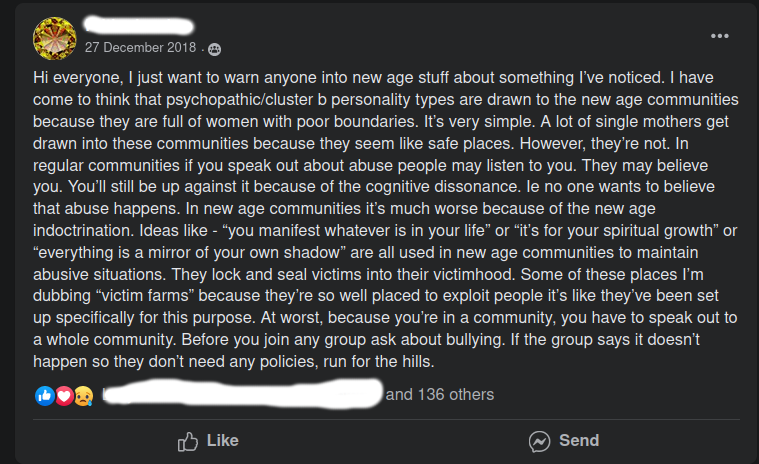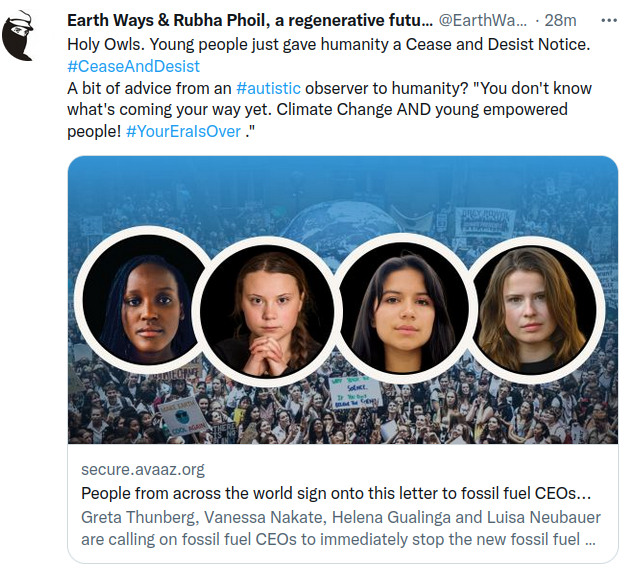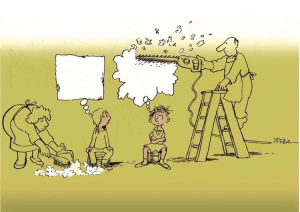Is Rubha Phoil a CULT or an Ottercracy?
As a decolonisation and educational project, we want to make sure that we are not a cult and never will be able to become one in the future.
So please feel free to join us in this research exercise:
A: What is a Cult?
The word Cult comes from the Latin word Cultus, which means to worship.
A cult is an organised group whose purpose is to dominate cult members through psychological manipulation and pressure strategies. The culture of a cult is all about control.
We use the widely accepted BITE Model of Authoritarian Control below to dig into this question. We choose this model, because it looks at the wider picture of power abuse beyond what people think a Cult is: Undue Influence, Thought Reform, Brainwashing, Mind Control. We’d like to not leave any room for doubt that Rubha Phoil is a safe space for you and for vulnerable people to be.
This 9 min long video explains very well what a cult is in detail:
This page gives a few quick tips on how to recognise a Cult.
B: Cults are usually headed by a powerful leader who isolates members from the rest of society.

A cult of personality, sometimes referred to as a personality cult, is defined as “exaggerated devotion to a charismatic political, religious, or other leader.”
Leaders of cults of personality often use imagery and the manipulation of mass media to form an exalted, even superhuman, version of their persona in the minds of their followers.
Their followers accept the leader’s persona and authority, which leads to their devotion to the leader and their mission to bring about an imagined future.
You can read more details about that here.
C: Cults are dangerous
They are dangerous because they typically rely on deceptive and authoritarian practices to make members dependent on and obedient to the group or mission.
Cults often cut members off from other forms of social and financial support and pose both physical and psychological risks to members of the group.
A cult is all about control.
Some examples: A cult leader will not tolerate criticism, uses guilt and shame to control people, often uses different moral standards for themselves than for other cult members, breaks down people’s sense of identity, hides their finances from scrutiny and makes people dependent on the group on all levels.
D: Is Rubha Phoil a Cult?
Our answer: Rubha Phoil is the opposite of a Cult. Spoiler: further down, we’re going to even argue that we are an anti-cult.
We’ll show you why:
Rubha Phoil is a small group of people who try to create a connecting culture together. This connecting culture is based on cultural elements given to us by indigenous cultures. These cultural elements are completely incompatible with what a cult needs to keep control.
Our arguments:
- Leadership: A cult is a pyramidal structure with a leader on the top. The individual becomes a minion who serves the leader. We at Rubha Phoil in contrast, work in an acorn. Which is a circle in which -ideally- 8 people hold a direction. Each direction embodies an ‘energy’ to create a beautiful holon (whole-on) together. A team that flows together in a beautiful dance of individual strengths. It still has a North, someone who decides the direction, but the North decides that direction by bringing out the strengths of the person in each direction. The roles are interchangeable and expertise gets passed on and shared for the benefit of the whole. The acorn decided together who holds the north. In our situation, the elders and the board of directors also have a voice in choosing the North.
Power that ownership of the property gives to Ludwig at the moment, will soon be diverted to the CIC and the community as a whole. (if all goes to plan) - Not only is Rubha Phoil not a cult, it is impossible for Rubha Phoil to be a cult or to become one. It purposefully has anti-cult measures built into its core structure, ethics and culture. To protect that culture, everyone that visits or stays here makes a signed commitment which includes commitments to all these anti cult and anti abusive control measures build into our culture:
- During our selection process before people visit, we have a conversation about vulnerabilities people may have.
We ask: Are there any medical -physical, mental or spiritual- conditions, vulnerabilities, trauma’s or triggers or needs we may need to be aware of? Is there anything you would like us to know about you that may help us to make your stay safe and healthy for you? We ask to make sure that people have outside support available if they need it. - In our agreement, we ask people to commit to asking for help if they need it.
- In our agreement we ask people to declare that they have sufficient connections (elders, anchors, trusted friends) outside of the community that they can turn to for advice if they need it. If they don’t have these, they commit to finding them.
This is one of the most important reasons why Rubha Phoil can not be or turn into a cult. A control person wants to disconnect their subjects from information that might be harmful to the control itself. We in contrast encourage it. - We have a culture of asking and valuing feedback. It is the 4th principle of permaculture. We try to organise individual feedback on a weekly-if not biweekly basis between project manager and the team. The heart stone is also always available to be used.
- The accusations of us being a cult are not being swiped under the carpet, instead they are being used to make sure and analyse to make sure that we are not a cult. Not now and not in the future. You are looking at this analysis.
If you ask us, this is the very proof that we are not a cult. A cult leader would never open themselves up to be checked and investigated. But there is a lot more…. : - We have regular sharing circles, in which we encouraged to share things that are important to us. Including this topic you are reading about now.
- Our daily communication culture has a heart stone tool. It is an equaliser to make sure that all voices are heard. It empowers people to be able to speak and allows everyone to be heard. You can read more here: www.rubhaphoil.org/heart2heart
- We are not arrogant enough to think that we have the answers. We didn’t reinvent the wheel of a connecting culture. We have and want to learn from people who have a culture of connection that is tens of thousands of years old. From outside the colonised world: indigenous cultures.
- Our management team on the Rock is balanced out by elders and a board of directors, many of whom are not living in the Bubble of the Rock Rubha Phoil. This helps to prevent ‘Groupthink‘.
- We have a buddy system embedded in our policies and culture. Every new person who arrives here gets a buddy assigned to them until they find their own friends. That helps them to find their way safely in the community. This is done so that people feel safe to ask those questions they might be afraid to ask from people in a position of authority.
- We provide people with phone numbers to the outside world they can call in case they need help.
- Internet access is not controlled. People are encouraged to have regular conversations with family, friends and anchors.
- We do value privacy a lot. Our own and each others. We ask people to ask for permission before posting private spaces or faces or personal stories on the internet, but overall, sharing of stories is not controlled.
- Self awareness is cultivated consciously and deliberately. We practise bird language, tracking and nature connection to that aim. Birds are really aware creatures and excellent teachers of that awareness. More about how birdlanguage frees you from colonial mind control here:
- We organise and encourage self empowerment programs for women and for everyone else too. Women’s circles are a basic ingredient of our culture.
- #metoo is a regular topic in our conversations. Many visitors have learned a lot about this perspective. Women have learned from each other, but also educated others, including us, privileged men, even an ex-police officer.
- We are trauma aware people. We consciously heal trauma, we put self care first. People are encouraged to seek psychological support from outside our community.
- We design a system to create individual and community independence. Permaculture is a revolution.
- We offer the possibilities of £-less exchanges.
- We create opportunities for people to take some value of what they created on the Rock away from if they want to leave. To facilitate a fresh start. This is after all fair. It also reduces dependency.
- Our economic model allows people from outside the Rock to also benefit from the wealth we create together. It reduces the need to stay a resident and reduces dependency.
- We have a Peace-making Policy and Process
- We have a Complaints Procedure in which people can ask for help to resolve potential conflicts with people who hold power
- We have a Equality, Diversity and Inclusion Policy
- We have a Anti-bullying policy
- We have a Child safeguarding and protection policy
- We have a Child safety guidelines for parents, guardians and carers
To top it off, lets do an even deeper academic analysis:
Let’s show that Rubha Phoil is not a cult and that Colonial Culture may be a Cult instead.
We use the BITE model, as mentioned on top of the page.
While no two cults are exactly alike, there’s significant overlap in the methods they use to burrow into people’s lives and become their primary influence.
In his BITE Model, Hassan divides an extensive list of those common methods into four major categories. Based on research and theory from leading expert psychologists and scholars who’ve studied brainwashing, “BITE” stands for
Behaviour, Information, Thought, and Emotional control.
Is Rubha Phoil a Cult BITE model spread sheet – Sheet1E: We understand that it may look as if Rubha Phoil is a cult
Firstly: Cults are real and more common than you think:
– This recent article in the Guardian gives a clear example. It describes the story of a young woman who ended up in a Cult. This quote sums it up: ‘I was asked to ponder why I had created violence in my life, which I gratefully did’ … Sarah Duguid when she was about 16.
– Sometimes the definition of a Cult might not quite hold up, yet that doesn’t mean it is a safe space: A woman posted this in an ‘intentional community’ facebook group.

139 facebook users agreed with her, none disagreed. Many communities are not a safe place to be.
– Revealed: ‘Hidden epidemic’ of abusive cults in UK, with 2,000 groups operating freely. (pay wall) Thousands have suffered sexual abuse, isolation from friends and family and modern slavery at the hands of UK cults
Secondly: We do have some similarities for people who want to argue that we are a cult to focus on:
We do practise a form of mind control at Rubha Phoil. We try to identify colonial mind patterns or more commonly called conditioning in ourselves and in each others’ patterns and try to change them. For example: I have a dear friend, who invariable greets me with an apology every time she opens her door for me. “Sorry the door is locked, sorry I am not dressed yet, sorry the kettle is not on yet,….” I recognised that to be a left over of colonial culture. More specifically in her case, as explained to me by feminists: I think it is a symptom of what the feminists call ‘Good Girl Syndrome’. The left overs of -as a little girl- being conditioned to be subservient to people in authority, mostly men.
So we, at Rubha Phoil, have a culture in which we kindly and supportively bring awareness to this conditioning when we notice it. This too is mind control. Controlling the mind, reprogramming it to serve our own well being first. Lots of self improvement and growth techniques are mind control. So is meditation.
What we advice people and ourselves is this: We need to look out for whether the control is constructive or destructive mind control and if people choose consciously to go through this process of decolonisation. Like many techniques, mind control is not inherently good or evil. If mind control techniques are used to empower an individual to have more choice, and authority for their life remains within themselves, the effects can be beneficial. For example, benevolent mind control can be used to help people quit smoking without affecting any other behaviour. Mind control becomes destructive when it undermines a person’s ability to think and act independently. If it is destructive can be determined when the overall effect of the four topics of the Bite Model (See PDF above and below) components promotes dependency and obedience to some leader or cause: (It is not necessary for every single item on the list to be present for it to be destructive.) If it promotes growth, self awareness, is open and accountable, if it promotes independence, freedom from control and a sense of self worth, if it dismantles power forms it is beneficial.
Reply to the suggestion that there is a hareem on Rubha Phoil: We do have a lot of young women visiting Rubha Phoil. The patriarchal male ‘hater’ often assumes or projects their own sexual desires onto us, that the presence of young women can only be because of malicious reasons.
Please allow us to reply with the paraphrased words of the young women themselves: “How dis-empowering it is to hear these comments. They’re reducing us to sex objects in the minds of the people who use these words. Do they really think that we can’t make up our own minds and hearts? These creeps are projecting their own mindset onto us. ”
Comment from Ludwig: “I really like working with young people. Older people find it much harder to get their heads around a new way of looking at the world. Young women are much further ahead than men too. My hypothesis is that after the ‘#metoo break through into the collective awareness’, many have learned to see the colonial patriarchal oppressive culture already while men are still catching up.

If you haven’t noticed it yet, the young women are the next generation of people that is now emerging out of universities and schools. They grew up with the knowledge that they have to fight for their survival. And they are doing it!”
I don’t want to assume their genders, but it looks like these 4 young women: Vanessa from Uganda, Greta from Sweden, Helena from Ecuador, Luisa from Germany demonstrate my point quite clearly. Their cease and desist letter received almost 1 million signatures in a few days!

Perhaps you may understand it even better when I remind you that the Taliban is banning women from education and even from libraries. Educated women are truly dangerous to men in power.
I see this as a leverage point where I can make the difference I am trying to make to the world go further. The energy I put into educating women travels further as they are really good at passing it on. The future we believe in is one of equality between the sexes and genders. Women have been oppressed for too long.
Scientists agree with me. THE most effective way to combat climate change is educating women and girls.
They are the ones that are changing the world. Women have taken a decisive leading role into this movement. They are well clued up and are eager to learn, much more so than the average young male. I, as a teacher, only have the capacity to teach a very few people what I have learned before the sh*t hits the fan properly.
Working with young women in leadership roles makes so much sense. It makes my expertise go so much further!
If you think that is suspect in any way, I suggest to get your creepy minds out of the gutter.”
It is indeed so that one can learn so much from the abuse that people throw at us. They say a lot more about them than about us. It may be worth while looking into the browser history of the people that use these words!
Thirdly: How easy it is to see a cult by people who are wounded
Some people are born with a deep sense to want to create. Colonial culture and more specifically the education system does not promote creativity. In fact Sir Robinson argues in this TED talk that schools kill creativity.
Fourthly: Narcissistic Cultist Colonial Culture points the finger at de-colonisers for being a cult.
Have you ever noticed that the insults that people throw at you are usually labels which are more applicable to themselves than to you?

It is such a common tactic of people who are found out when they are doing something that is not OK, to point the finger at someone else, often the messenger and accuse them of the very thing that is being exposed. In psychology this is termed Shadow Projection.
Using the word Cult in personal attacks is a very common tactic. Such as in this example to the right with Harry and his wife Meghan. I think it would be an interesting exercise to compare the Royal Family to a Cult using the information we collated here.
If you have any comments or questions, please don’t hesitate to contact us.




